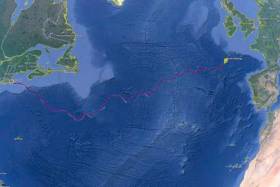Displaying items by tag: Ocean Research
Ocean Research Drone ‘Glider’ Recovered Off Baltimore
#MarineScience - A deep-ocean drone was recovered with the help of the Marine Institute off the coast of Baltimore in West Cork earlier this month.
The SILBO autonomous glider, deployed by Teledyne Webb Research USA from Falmouth, Massachusetts in April last year, was sent on a mission to cross the North Atlantic and gather data from the ocean.
SILBO is one of 16 gliders undertaking 128,000km of co-ordinated surveys following an ocean gyre around the five global ocean basins. as part of the Unesco-endorsed Challenger mission.
Gliders look like torpedoes but lack propellors and an engine, instead relying on a movable internal ballast and external moveable fins to move across the ocean. They contain large battery packs to power the movement of the fins and change the internal ballast, as well as to power the glider’s sensors for ocean monitoring.
"Gliders like SILBO are equipped with a variety of sensors that enable scientists to monitor the ocean temperature, salinity, currents and other ocean conditions as well as offering a picture of places in the ocean that traditional satellites and research vessels may not be able to,” explained Aodhan Fitzgerald, RV operations manager at the Marine Institute, which used its remote operated vehicle to help recover the drone off Baltimore on Thursday 9 March.
“By contributing real-time data to a global portal, deep-sea gliders enable marine scientists to mutually benefit by creating a better assessment and understanding of the ocean and evaluating the ocean environment.”
Gliders like SILBO have the ability to go where it is impractical to send people. They can travel major distances over long periods of time, moving both horizontally and vertically through the ocean, continually gathering data.
The drones are also programmed to surface at designated times throughout their mission, allowing them to transmit the data they have collected to shore while at the same time downloading new mission instructions.
This two-way communications ability allows gliders to continually gather information about the most important and diverse regions of our ocean basins.
The Marine Institute says it is currently developing its capacity to use such gliders as they are an important tool for marine scientists to study and map the dynamic features of the ocean.
"With the opportunity to learn more about deep-sea glider capabilities, SILBO will be used for a training session led by Teledyne Webb Research at the Marine Institute's facilities in Galway,” Fitzgerald added.
“This will involve Irish and international glider technicians learning how to overhaul the glider and prepare it for its next mission before it is re-deployed from Irish shores to complete further mission transects for this global initiative.”

























































